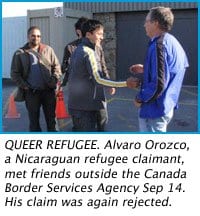A federal court judge in Montreal ordered a judicial review in the case of a Nigerian refugee applicant after immigration officials denied his claim because he is a member of the clergy, has two kids and doesn’t “look like a gay person.”
“I have a pile of 10 or 12 cases on my desk in which the federal court has said the refugee board has erred by applying ridiculous assumptions about sexual orientation,” says Toronto-based immigration lawyer Michael Battista. “Such cases are very frequent unfortunately.”
In a ruling two months ago Justice Maurice E Lagacé denounced the Immigration and Refugee Board (IRB) decision to deny Tunji Diran Leke status as “perverse” and slammed the board for ignoring, misappropriating and misunderstanding evidence used to establish his sexual orientation.
“It was patently unreasonable for the board to find that the applicant was not a homosexual because it was highly improbable that a homosexual would father two sons,” Lagacé wrote in the Aug 22 decision. “The board provided no explanation and no basis for this inference in spite of the evidence before it that homo-sexuals in Nigeria are forced to live double lives for fear of the consequences of living openly in same-sex relationships.”
Leke, who is a Christian pastor and married with two children, fled to Toronto from Lagos in October of 2005 after his boy-friend’s landlord walked in on the couple having sex a month earlier. The two were beaten, publicly humiliated and detained by police. Homosexuality is a criminal offence under Nigerian law.
He has since moved into the Church-Wellesley village, become a member at the 519 Community Centre and started a relationship with a new partner. In July 2006 Leke’s claim was denied by the board, which decided his sexual orientation wouldn’t be “readily identifiable by people in Nigeria.”
“Having observed the claimant throughout the hearing I do not find that there is anything to be gleaned from the claimant’s facial expressions, tone of voice or his physical [appearance] that would in and of themselves create an impression that this claimant was either homosexual or bisexual,” the board member hearing the case wrote in the decision.
Lagacé also ordered a new hearing in the case of another gay Nigerian refugee claimant, Eliot Osagie, on similar grounds. Alvaro Orozco, a Nicaraguan refugee claimant who was to be deported on Oct 4 but remains in the country, was also rejected last October because an IRB member didn’t believe he is gay.
Lawyers and refugee advocates argue the federal court’s findings highlight an urgent need for on-going sensitivity training for board members and a full appeals process to make it harder for homophobic judgments to slip through the cracks.
In the mid-’90s the IRB asked University of Ottawa associate professor Nicole LaViolette to conduct nationwide sensitivity training for members around issues of sexual orientation in an attempt to ensure fair treatment for queer refugees. LaViolette has travelled the country three times — in 1995, 1999 and 2004 — and says the IRB’s professional development materials regarding sexual orientation are probably the best of “any tribunal in Canada.”
Even so a system of political patronage combined with a high turnover of board members means claimants could end up facing unqualified or insensitive adjudicators.
“The board has been fairly good about trying to keep [sexual orientation] on the professional development agenda,” says LaViolette, “but there is a turnover and there are political appointments so there’s an issue of quality.”
Earlier this year Sean Rehaag, a doctoral candidate at the University of Toronto’s Faculty of Law who specializes in immigration issues, published a study showing that acceptance rates for refugee claims based on sexual orientation are similar to or slightly higher than claims based on race, religion, political beliefs or ethnicity. However, in a recent Toronto Star column, he joined the chorus of critics denouncing the Conservative government’s recent move to give the Minister of Citizen and Immigration a more direct role in vetting and naming IRB adjudicators as “unduly politicizing the process.”
Although Battista has called for the IRB to adopt specific guidelines for sexual orientation cases similar to those used in cases involving children and civil strife, LaViolette remains skeptical. She believes the existing gender guidelines could be revised to acknowledge how queer claimants fear persecution because their lifestyle inherently violates the accepted societal gender norms.
“Historically the IRB has been progressive in its legal analysis of sexual orientation as related to the [United Nations] Convention definition,” says Peter Showler, director of The Refugee Forum at the University of Ottawa’s Human Rights Research and Education Centre. “It also did attempt to provide training on the issue including credibility issues related to sexual orientation. Such evidentiary issues can be very subtle, complex and culturally specific. These are the kinds of continuing training challenges that the board faces in several areas of the law and types of persecution.”
“To be fair even for the most informed board members [sexual orientation] is a very difficult issue,” says Janet Dench, executive director of the Canadian Council for Refugees (CCR). She says pressure from Ottawa to clear the backlog of cases has pushed ongoing sensitivity training off IRB’s radar and admits her own organization should do more to encourage it. CCR has called for Ottawa to create a full appeals process so that claimants don’t have to go to federal court in the event of a bad decision.
Judicial reviews are an expensive and difficult road. Between 1998 and 2004, 57 percent of determinations heard by the federal court were denied and only 1.6 percent of negative IRB decisions were overturned, according to the CCR.

 Why you can trust Xtra
Why you can trust Xtra


